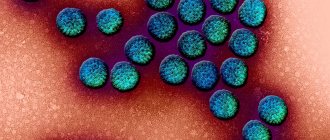What are intestinal infections and where do they live?
Intestinal infections are infections of the body by bacteria, viruses or parasites through the gastrointestinal tract. Normally, many different types of bacteria live in our intestines. But if food, antibiotics or infection cause dysbiosis, unpleasant symptoms begin.
Symptom or cause? What is dysbiosis and what to do about it?
Most pathogenic bacteria enter the body with water or food. For example, you swam in dirty water and accidentally swallowed some, ate undercooked meat, a raw egg or expired kefir.
Intestinal infections are also called “dirty hand disease” because you can become infected through contact. An underestimated source of infection is patients without clinical manifestations of the disease.
A person remains infectious throughout the entire disease cycle: from the incubation period to complete recovery. And it can take up to several weeks. The infection enters the environment through feces and vomit, and viruses are transmitted by airborne droplets.
In the summer, the risk of infection is higher.
People interact with each other more often and more closely, the shelf life of products is shortened, and in warm conditions bacteria multiply faster. It is important to pay attention to children, who often accidentally swallow contaminated seawater and taste everything they see.
Bacterial pathogens of intestinal infections: Shigella, Salmonella, Vibrio cholerae, Staphylococcus, Escherichia, Brucella, Clostridia. Viral pathogens of intestinal infections: rotavirus, enterovirus, adenovirus. Bacterial intestinal infections associated with infection with staphylococcus and salmonellosis are more often diagnosed.
Types of viruses
Intestinal viruses are divided into several types:
- Rotaviruses. They belong to the Reoviridae family and provoke outbreaks of disease during the cold season. The virus causes severe diarrhea with dehydration, especially in children under three years of age. In some cases, urgent hospitalization and intensive rehydration therapy (restoring fluid balance in the body) are required.
- Noroviruses. It is believed that up to 50% of acute intestinal infections are caused by these viruses (family Caliciviridae). In children, noroviruses are the second most common cause of disease after rotaviruses. The virus was first identified in 1972. Clinical symptoms are similar to rotavirus infection. You can become infected not only through airborne droplets, but also through household contact, for example, through a handshake, a kiss, unwashed hands, any objects, toys used by an infected person or a carrier in the recovery stage. A person is contagious in the first two days from the moment of infection. But it may still be “dangerous” for some time, since eliminating the norovirus from the body can take up to two weeks. The first symptoms of the disease appear within 12-48 hours. Immunity is formed, but it is not stable; it lasts for about eight weeks. So you can get sick again if you don’t follow the rules of hygiene.
- Enteroviruses. Representatives of the family Picornaviridae. Most often, the pathogen attacks children, including those in the first year of life, as well as people with weakened immune systems. It is transmitted in the same way as other intestinal viruses.
How to identify the symptoms of an intestinal infection?
It is worth remembering that on average the incubation period of an intestinal infection ranges from 4 hours to 48 hours, in some cases it reaches 2 weeks or more.
Symptoms:
- Heat
- Repeated vomiting
- Severe abdominal pain that is not relieved by vomiting
- Prolonged loose stools (in some cases with mucus or blood)
- When infected with viruses, symptoms similar to influenza may also be observed: fever, headache, aching limbs, runny nose. There is even such a disease - intestinal flu.
All these symptoms can be considered food poisoning. But here's what to pay attention to so as not to confuse an intestinal infection with something else:
How to avoid food poisoning?
- symptoms last longer than 2-3 days;
- vomiting and diarrhea do not stop, and abdominal pain does not improve after vomiting;
- there is an admixture of mucus or blood in the stool, the color of urine or feces has changed significantly;
- you lose consciousness or have concomitant chronic diseases.
In this case, we strongly recommend that you consult a doctor. The consequences of infections are much more serious than the consequences of poisoning.
Important: do not take antibiotics without a doctor's recommendation. Especially if you have a viral infection. With a virus, they are ineffective and can cause harm by destroying the intestinal microflora.
Prevention of acute intestinal infections (AI)
Great attention is paid to the prevention of intestinal infectious diseases. Some progress has been made along this path, but intestinal infections remain one of the most serious health problems today.
In the structure of infectious pathology, intestinal infections account for about 20%, causing significant economic damage.
Acute intestinal infections include: dysentery, salmonellosis, gastroenteritis, viral hepatitis A, foodborne illnesses, typhoid fever and paratyphoid fever. In recent years, the role of viruses in the occurrence of acute intestinal infections has increased: rotavirus gastroenteritis, norwalk virus infection (epidemic viral gastroenteritis) are popularly known as “intestinal flu, ARVI with intestinal syndrome.” Acute intestinal infections can occur at any time of the year: viral, more often in cold weather, with an increase in the incidence of influenza and ARVI, the peak incidence of bacterial infections occurs in the summer season. Most pathogens of intestinal infections are highly resistant. For example: the causative agents of typhoid and paratyphoid remain viable in milk for more than 70 days, in water for several months. Dysentery microbes live and multiply in milk for about 6 days, in river water they persist for up to 35 days, viruses remain viable on various environmental objects from 10-15 days to 1 month, in feces - up to 7 months.
How do intestinal infections manifest themselves?
As a rule, they begin acutely, with fever, loose stools, abdominal pain, and possibly nausea and vomiting.
The main spreaders of intestinal infections are sick people. Not only those who have a pronounced intestinal disorder can be dangerous, but also people who are so mildly ill that they do not even seek medical help. It is among them that carriers of infectious microbes are especially often found. Practically healthy bacteria carriers are no less dangerous, because they are not isolated, they communicate widely and freely with other people and, not considering themselves capable of infecting, do not follow precautions.
With all intestinal infections, the patient's discharge is most contagious. The disease develops only when the microbe enters the body through the mouth. In most cases, our own hands are to blame for this. First, germs get on them - all you need to do is grab the door handle or toilet flush, touch objects that the patient has used, and forget about the need to wash your hands! Contaminated hands can transfer germs to food. In minced meat, meat, cold appetizers, milk, dairy products, cream products, salads, the conditions for life and reproduction of intestinal microbes are the most favorable. At the same time, these contaminated products themselves seem quite fresh and suitable for eating. This is why everyone who prepares food needs to be very careful. Following food preparation and storage rules is an important protective measure. Every home should have separate boards for cutting raw and cooked meat, fish, and vegetables. If you use the same board or the same knife, dangerous microbes can be introduced into already cooked products. Within two to three hours they multiply at room temperature and reach such a quantity that can cause disease.
In this regard, it should be recalled: products, especially boiled ones, must be stored in the cold, protected from flies in every possible way and subjected to heat treatment before eating.
Another important route of pathogen transmission is contaminated water. During the hot months, everyone who goes on holiday outside the city should exercise great caution - you should always take a supply of boiled water with you so that you do not have to use unverified sources. Vegetables and fruits purchased at markets must be washed with boiled water. You can also become infected by swimming in a river, pond, or lake, because people often swallow water during this process.
The most reliable way to prevent the spread of intestinal diseases is to neutralize the source of infection in advance. That is why timely access to a medical facility for any disorder of the gastrointestinal tract is of exceptional importance. The doctor can, if necessary, isolate the patient, carry out disinfection, and begin treatment.
The spread of intestinal infections can be prevented.
Experts from the World Health Organization have developed ten “golden” commandments for preventing intestinal infections:
1. Selecting safe foods.
2. Cook food thoroughly.
3. Consume food immediately after preparation if possible.
4. Store food products carefully.
5. Carefully reheat food prepared in advance.
6. Avoid contact between raw and prepared foods.
7. Wash your hands often.
8. Keep the kitchen clean.
9. Protect food from insects, rodents and other animals.
10. Use high-quality, clean water.
More about the golden rules:
10 RULES FOR PREVENTION OF OCI (ACUTE INTESTINAL INFECTIONS)
To effectively educate the population of the entire planet on the prevention of acute intestinal infections (acute intestinal infections), experts from the World Health Organization have developed ten “golden” rules for the prevention of food poisoning (infections).
1. Selecting safe food products. Many foods, such as fruits and vegetables, are consumed raw, while others are risky to eat without pre-processing. For example, always buy pasteurized milk rather than raw milk. When shopping for food, keep in mind that the purpose of post-processing is to make the food safe and extend its shelf life. Certain foods that are eaten raw require careful washing, such as lettuce.
2. Prepare food thoroughly. Many raw foods, mainly poultry, meat and raw milk, are often contaminated with pathogenic microorganisms. The cooking (frying) process kills bacteria, but remember that the temperature in all parts of the food must reach 70°C. If the chicken is still raw at the bone, place it back in the oven until fully cooked. Frozen meat, fish and poultry must be thoroughly thawed before cooking.
3. Eat cooked food without delay. When cooked food cools to room temperature, microbes begin to multiply. The longer she remains in this condition, the greater the risk of getting food poisoning. To protect yourself, eat food immediately after cooking.
4. Store food carefully. If you have prepared food for future use or want to store the rest of it after eating, keep in mind that it should be stored either hot (at or above 60°C) or cold (at or below 10°C). This is an extremely important rule, especially if you intend to store food for more than 4-5 hours.
It is better not to store food for children at all. A common mistake that leads to countless cases of food poisoning is storing large amounts of warm food in the refrigerator. This food in an overloaded refrigerator cannot cool completely quickly. When the center of a food product is kept warm for too long (temperatures above 10°C), microbes survive and rapidly multiply to levels that are dangerous to human health.
5. Reheat pre-cooked food thoroughly. This is the best measure of protection against microorganisms that could multiply in food during storage (proper storage inhibits the growth of microbes, but does not destroy them). Once again, before eating, thoroughly warm the food (the temperature in its thickness should be at least 70 ° C).
6. Avoid contact between raw and prepared foods.
Properly prepared food can be contaminated by contact with raw food. This cross-contamination can be obvious when, for example, raw poultry comes into contact with prepared food, or it can be hidden. For example, you cannot use the same cutting board and knife to prepare raw and cooked (fried) poultry. This practice can lead to a potential risk of food contamination and the growth of microorganisms in them, with subsequent human poisoning.
7. Wash your hands often. Wash your hands thoroughly before preparing food and after every break in the cooking process - especially if you changed your baby or were in the toilet. After handling raw foods such as fish, meat or poultry, wash your hands again before handling other foods. And if you have an infected scratch (wound) on your hand, be sure to bandage it or apply a bandage before you start cooking. Also remember that pets - dogs, birds and especially turtles - often carry dangerous microorganisms that can get into your food through your hands.
8. Keep the kitchen perfectly clean. Since food is easily contaminated, any surface used to prepare it must be absolutely clean. Consider every food scrap, crumb, or dirty spot as a potential reservoir of germs. Towels for wiping dishes should be changed every day. Mopping cloths also require frequent washing.
9. Keep food protected from insects, rodents and other animals. Animals often carry pathogenic microorganisms that cause food poisoning. To reliably protect products, store them in tightly sealed jars (containers).
10. Use clean water. Clean water is extremely important for both drinking and cooking. If you are in doubt about the quality of water, boil it before adding it to food or before using it.
Prevention of acute intestinal infections (AI)
In everyday life, we are surrounded by more than 100 types (!) of microscopic agents that can cause an acute infectious process of intestinal disease in humans. These are, for example, bacteria that cause dysentery, salmonellosis, yersiniosis, clostridiosis, campylobacteriosis, staphylococcal poisoning and viruses that cause rotavirus and enterovirus infections in humans, etc.
The main source of infection for viral and bacterial intestinal infections are patients and bacteria carriers (persons with an erased form of acute intestinal infection). In addition to a sick person, in case of salmonellosis, sources of the infectious agent are domestic animals (cattle, pigs, poultry), the meat of which is contaminated. Salmonella can be found in poultry eggs - ducks (especially), chickens. In case of staphylococcal poisoning, the source of the infectious agent is also a person who has pustular skin lesions (felon, festering wound of the hand, etc.) or chronic inflammatory processes in the nasopharynx. It is especially dangerous if confectioners and cooks have these diseases. Staphylococcus grows well and quickly on sweet products (cream, jelly, compote, fudge, etc.). When multiplying, it secretes poison (toxin). If a person eats food that contains staphylococcal toxin, then within a few hours he will experience acute poisoning.
By releasing pathogens into the external environment with feces, sick people or carriers of infection introduce it into food or onto surrounding surfaces of objects through dirty hands.
Of course, the most epidemically dangerous way of spreading infection is through food. Pathogenic bacteria, having come into contact with perishable food products that are not heat-treated through dirty hands, multiply there very quickly. Within 20-30 minutes the number of microbes reaches a level that is sufficient for infection. Moreover, the organoleptic properties of the product do not change in any way. The same thing happens when heat-treated and cooled ready-made dishes become contaminated. But there are foods, for example, vegetables and fruits, on which pathogenic microorganisms (yersinia) are always present. Therefore, before preparing vegetable salads or giving whole fruits to children, it is necessary to neutralize them by scalding or blanching after washing.
WHEN TRANSFERING
Infections through household transmission are spread in a chain manner. The development of an epidemic situation, if the administration of the institution does not take measures to localize and eliminate it, is carried out according to a single scheme. A child who becomes infected in the family from his parents introduces the infection into the group. Sometimes it is infected in a group from sick children or personnel caring for them. Subsequently, pathogenic microorganisms are transmitted from a sick child to healthy children through unwashed hands. The transmission of bacteria or viruses occurs through sanitary fixtures contaminated by a source of infection - washbasin taps, toilet flush valves, tableware, door handles, staircase railings, furniture, linen and other surfaces. The incidence, as a rule, limits one social circle (group, family), but neglect of the requirements of sanitary rules, as well as non-compliance by staff and children with personal hygiene rules, can lead to an outbreak throughout the entire institution.
Unlike bacteria, viruses do not multiply on the surfaces of objects, in water and food, but if they enter the human body, even a few viral particles can cause acute intestinal disease.
In almost all acute intestinal infections caused by various pathogens, the leading clinical manifestation is stool disorder. In this case, vomiting is often observed, which is preceded by nausea. After vomiting there comes a feeling of relief. With intestinal infections, stool disorder is combined with signs of intoxication and is accompanied by an increase in body temperature. With significant loss of fluid through vomiting and loose stools, dehydration develops, which, especially in children, can cause disturbances in the functioning of the cardiovascular system of the body. Early seeking qualified medical help and timely treatment will reduce the risk of these complications in children.
As a rule, the disease begins acutely with the appearance of the above symptoms, however, especially with viral intestinal infections, it can begin and proceed for several days with a slight increase in body temperature and catarrhal phenomena in the nasopharynx (redness of the mucous membrane of the arches in the oral cavity, runny nose and cough) . Stool upset and vomiting may occur later - after 2-3 days, but the patient becomes infectious from the first hours of the disease.
After suffering an acute intestinal disease, recovery occurs and the disease does not leave any consequences. But sometimes, this is especially typical for dysentery and salmonellosis, pathogenic microorganisms are in no hurry to part with the patient, periodically causing relapses of the disease. As a rule, this occurs in cases of improper treatment of the patient (self-medication) or late seeking medical help. A person can be a carrier of the pathogen for years, which contributes to the occurrence of chronic forms of the disease.
WITH THE AIM OF
effective prevention of acute intestinal infections, an atmosphere in which each employee will feel that he is not the last link in this work must be formed in the institution’s team and every day responsibly fulfill the requirements stipulated by the sanitary rules (SanPiN No. 14-31-95 “Sanitary rules and standards for the design and maintenance of preschool institutions
Acute intestinal infections
Beware of rotavirus infection
Despite the cold season, cases of acute intestinal diseases continue to be recorded. As a rule, small children under the age of three are involved in the epidemiological process. The dominant syndrome in children is gastroenterocolitis, and the causative agent in some cases is rotavirus.
Rotavirus infection (RVI) is widespread throughout the world, but the proportion of rotavirus infection is higher in more developed countries, which have already achieved significant success in controlling acute intestinal diseases of bacterial etiology. An epidemiological feature of RVI is a clearly defined seasonality of the epidemiological process, which occurs during the cold season with high humidity, the peak seasonal rise is February-March.
- – rotaviruses are stable in the external environment, resistant to many chemical agents and heat. They are characterized by increased resistance to a number of chemical disinfectants, while others are more effective in higher than usual concentrations. At low temperatures (about minus 20 degrees), rotaviruses remain infective for several years.
The main source of infection are infected human patients, as well as virus carriers.
RVI has a fecal-oral mechanism of infection typical for acute intestinal infections. The main routes of spread are household contact, water, food, and the factors of infection transmission are numerous - water, since it is not subjected to special purification from viruses, contaminated vegetables and fruits, milk and dairy products contaminated with the virus during processing, storage, and sales.
But since RVI is an intestinal infection, its prevention is similar to the prevention of acute intestinal infections caused by bacterial flora. Namely, observing the rules of personal hygiene, thoroughly washing your hands, especially before eating and preparing food. It is necessary to wash vegetables and fruits thoroughly, and do not drink water from open reservoirs. It is strongly recommended not to purchase food products from unauthorized retail outlets, without documents certifying their quality and safety.
Following these simple preventive measures will protect your child from rotavirus infection.
Useful tips
on the prevention of intestinal infections in children
Infection with intestinal infections can occur through food, water or personal contact. That is, it is very easy for a child to get sick by eating low-quality contaminated food, drinking bad water or another drink, as well as playing or simply having contact with sick children and adults, using other people’s “contaminated” things and toys.
Based on this, we can draw a number of conclusions and try in every possible way to prevent pathogens of intestinal infections from entering the child’s body.
From infancy, teach your child to wash his hands every time before eating, after using the toilet and upon returning.
1. Make sure that the child does not put fingers and various objects in his mouth, cut his nails in a timely manner.
2. Food should always be fresh - do not cook for children in advance, especially in summer.
3. Meat, fish and dairy products must certainly be subject to prolonged heat treatment.
4.Wash vegetables and fruits very carefully.
5. Try not to store ready-made dishes, but if necessary, maintain the appropriate temperature conditions.
6.If a child goes to kindergarten, teach him to use only his personal belongings (towel, comb, etc.).
7.If there is a sick person in the house, he must be isolated from the child. All common items must be disinfected, as well as the patient’s clothing.
8.Door handles and outdoor toys also need to be regularly treated with antiseptics.
9. Indoor toys should be washed and washed, even if you do not take them outside.
10. Keep the house clean, do not walk around the living rooms with shoes on (not indoor shoes), and ventilate the room several times a day.
Of course, it is impossible to insure against everything, but with a responsible approach it is quite possible to protect yourself from many troubles, significantly reducing the child’s chances of catching an intestinal infection.
How to treat and not pass on an intestinal infection to others?
Treatment depends on the pathogen and severity of the disease. For example, dysentery or norovirus can be treated at home. But only a specialist can help with salmonellosis. In any case, to make a decision on treatment, you must call a doctor and undergo laboratory tests.
Here's what you can do to get started:
- Restore water-salt balance. It is better to drink boiled or bottled water with the addition of special solutions for rehydration
- Take enterosorbents to relieve intoxication of the body, as well as painkillers and antipyretics
- Eliminate fried, salty, spicy, raw foods from your diet
- If you want to eat, it is better to give preference to simple food: soup, rice, bread
- Rest more
How to avoid infecting others if you or your loved ones are sick?
- Wash your hands thoroughly
- Regularly disinfect common areas and the patient's room: especially the toilet, bathroom, kitchen
- Provide separate dishes and towels for the sick person
- Change bedding and clothing regularly and wash them at high temperature (60°C)
- Limit your social circle, isolate the sick person
It is recommended to visit public places no earlier than two days after the symptoms have completely disappeared, and places such as a swimming pool are better after two weeks.
How to avoid getting infected with rotavirus, intestinal flu and other infections?
There are a few simple rules:
- Wash your hands thoroughly with soap after visiting public places, toilets, and transport.
- Consume only thermally processed foods: especially meat, fish and eggs. Be careful with dairy and lactic acid products
- Wash vegetables and fruits
- Avoid expired products
- Drink only bottled or boiled water (especially on vacation), do not swallow water when swimming in open water.
All intestinal infections have a high degree of contagiousness, or infectiousness - the ability to be transmitted from organism to organism. Risk groups include young children and the elderly, patients with immunodeficiency, and employees of medical institutions and catering establishments.
You can get a stomach infection again because you don't develop immunity to it. However, a strong and rich intestinal microbiota will help prevent infection and ease the course of the disease. The more diverse the composition of the microbiota, the stronger the immune system and the body's immune response. This is why it is so important to take care of beneficial bacteria and maintain their balance in the intestines.
You can find out how diverse your microbiota is with the Atlas Microbiota Test.







